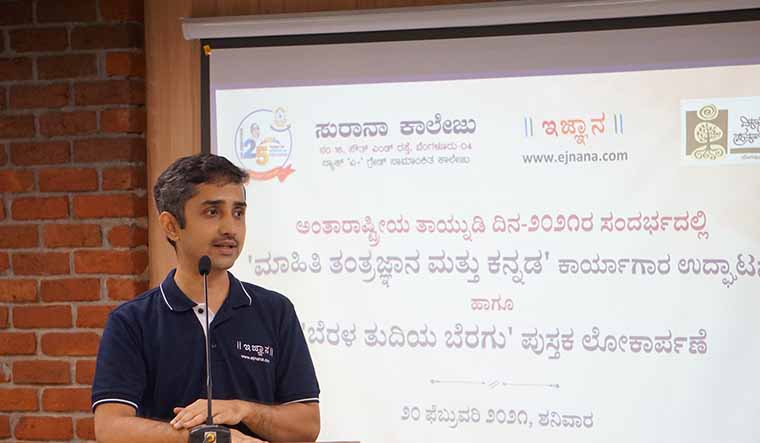What would you call the Internet of Things in Kannada? Asks Srinidhi T.G. while fumbling for an answer himself.
He identifies himself as a science communicator. The Bengaluru-based software professional has nurtured his love for popularising science to a general audience in regional dailies, since college. Back in 2007, when blogging was all the rage, he started Ejnana.com to communicate news, ideas and concepts around science and technology in Kannada to a rural demographic slice in the state. To give a sense of IoT, Srinidhi wrote to his readers that, just like they already know the internet and how it connects everything on the web, they should imagine what if washing machines, fridge, mixer grinders and other home appliances connect to the same network? "This is an underserved area. There is a great appetite for such content in the rural belt in Karnataka. But students like it when it is not textbook-ish. It has to be presented as popular science which is easily accessible," says Srinidhi, who often condenses journal articles from IISc into a more approachable format in his blog.
Srinidhi, however, does not know how technical journals can be translated into regional languages. "We have not done much work there. I don't see our audience engaging with that stuff," says Srinidhi.
On July 8, after the swearing-in of the new Education Minister Dharmendra Pradhan, Prime Minister Narendra Modi called for a larger role to be played by technological and R&D institutions which will be heralding “India's Techade”. To implement the provision of the NEP, the education ministry is getting ready to set up a task force which will deal with the nitty-gritties of imparting technical education in regional languages. Even degree courses like B.Tech in Indian Institutes of Technology (IITs) will be included as part of this plan to break the rural-urban divide in technical education. Another aspect of this transition is translating global (technical) journals into regional languages. The translation work is expected to begin by December 2021. But one wonders how jargons, scientific concepts and academic-speak in peer-reviewed journals can be effectively communicated in local languages.
"Challenges of translating technical journals into regional languages would be manifold. The primary one being the technical terms don’t have regional equivalents. And as a result, we end up using English words even in the translated content. Not only that, sometimes when content is translated into a local/regional language, certain colloquialisms come in, which don’t adequately describe the original context. In fact, many times the complete sense of the point being made can be changed. Which can be detrimental if not quality checked," says Aarti David, director of publishing at SAGE Publications, one of the leading academic publishers. "The biggest challenge in regional language translations is that these cannot be done word-to-word. It is in actuality an exercise that involves rewriting the complete content to make sense of it. Another problem that I foresee is that online regional content consumption is limited; as access is a big issue. Even though we are fast moving to a digital system of education, we have a long way to go in being able to reach the consumers of this content," adds David.
Srinidhi's "Ejnana" comes from Jnana which is "knowledge" in Kannada. Incidentally, "vijnana" means science and Ejnana is a colloquial version of vijnana. Perhaps, this is the kind of informal, idiomatic relocation that might be required to make global journals non-intimidating in local Indian languages.
Srinidhi is currently helping out with creating content for a popular science magazine called Kutuhali, with help from Vigyan Prasar, which comes under the Department of Science and Technology. Recently, he was also shortlisted as a finalist in the Falling Walls conference, an annual science competition in Germany where young researchers and entrepreneurs get to present their research projects, business plans and social initiative ideas. Srinidhi was selected in the science engagement category. "Last year, we were bombarded with some many new terminologies around Covid-19. I came up with a 40-concept intro e-book in Kannada to better explain Coronaspeak to my readers. This idea was greatly appreciated at the conference," says Srinidhi, who expounded on concepts like "break the transmission" with a trending book exchange campaign where gifting one person leads to receiving 36 in return. "I added a bit of geometric transmission theory too in it."



